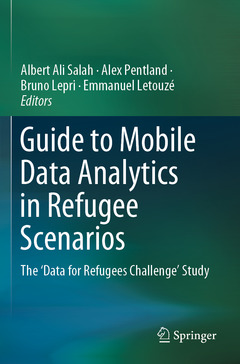Description
Guide to Mobile Data Analytics in Refugee Scenarios, 1st ed. 2019
The 'Data for Refugees Challenge' Study
Coordinators: Salah Albert Ali, Pentland Alex, Lepri Bruno, Letouzé Emmanuel
Language: English
Subjects for Guide to Mobile Data Analytics in Refugee Scenarios:
Keywords
Mobile Phone Data; Call Detail Records (CDR); Refugees; Refugee Mobility; Evidence-Based Healthcare Policy; Evidence-Based Education Policy; Evidence-Based Unemployment Policy; Evidence-Based Social Integration Policy; Evidence-Based Human Safety and Security Policy; Ethics of Data Processing; Big Data Analytics; Information Visualization; Data for Refugees Challenge; computational social sciences
Publication date: 09-2020
Support: Print on demand
Publication date: 09-2019
500 p. · 15.5x23.5 cm · Hardback
Description
/li>Contents
/li>Biography
/li>Comment
/li>
After the start of the Syrian Civil War in 2011?12, increasing numbers of civilians sought refuge in neighboring countries. By May 2017, Turkey had received over 3 million refugees ? the largest refugee population in the world. Some lived in government-run camps near the Syrian border, but many have moved to cities looking for work and better living conditions. They faced problems of integration, income, welfare, employment, health, education, language, social tension, and discrimination. In order to develop sound policies to solve these interlinked problems, a good understanding of refugee dynamics isnecessary.
This book summarizes the most important findings of the Data for Refugees (D4R) Challenge, which was a non-profit project initiated to improve the conditions of the Syrian refugees in Turkey by providing a database for the scientific community to enable research on urgent problems concerning refugees. The database, based on anonymized mobile call detail records (CDRs) of phone calls and SMS messages of one million Turk Telekom customers, indicates the broad activity and mobility patterns of refugees and citizens in Turkey for the year 1 January to 31 December 2017. Over 100 teams from around the globe applied to take part in the challenge, and 61 teams were granted access to the data.This book describes the challenge, and presents selected and revised project reports on the five major themes: unemployment, health, education, social integration, and safety, respectively. These are complemented by additional invited chapters describing related projects from international governmental organizations, technological infrastructure, as well as ethical aspects. The last chapter includes policy recommendations, based on the lessons learned.The book will serve as a guideline for creating innovative data-centered collaborations between industry, academia, government, and non-profit humanitarian agencies to deal with complex problems in refugee scenarios. It illustrates the possibilities of big data analytics in coping with refugee crises and humanitarian responses, by showcasing innovative approaches drawing on multiple data sources, information visualization, pattern analysis, and statistical analysis.It will also provide researchers and students working with mobility data with an excellent coverage across data science, economics, sociology, urban computing, education, migration studies, and more.
Dr. Albert Ali Salah is affiliated with the Computer Engineering Department at Boğaziçi University, Turkey, and with Department of Information and Computing Sciences at Utrecht University, the Netherlands. He has co-authored over 150 publications on multimodal interfaces, pattern recognition, computer vision, and computer analysis of human behavior. Dr. Salah has received the inaugural EBF European Biometrics Research Award (2006), BUVAK Award of Research Excellence (2014), and the BAGEP Award of the Science Academy (2016). He is a Senior Member of the IEEE, and a member of the ACM.
Prof. Alex ‘Sandy’ Pentland directs MIT’s Human Dynamics Laboratory and the MIT Media Lab Entrepreneurship Program, co-leads the World Economic Forum Big Data and Personal Data initiatives, and is a member of the advisory boards for Nissan, Motorola Mobility, Google, Telefonica, and a variety of start-up firms. He has previously helped create and direct MIT’s Media Laboratory, the Media Lab Asia laboratories at the Indian Institutes of Technology, and Strong Hospital’s Center for Future Health. In 2012 Forbes named Sandy one of the ‘seven most powerful data scientists in the world’, along with Google founders and the CTO of the United States. His research has been featured in Nature, Science, and Harvard Business Review, as well as being the focus of TV features on BBC World, Discover and Science channels.
Dr. Bruno Lepri is the Research Director of the Mobile and Social Computing Lab (MobS Lab) at Fondazione Bruno Kessler (FBK), Trento, Italy. Bruno is also the Head of Research of Data-Pop Alliance, the first think-tank on big data and development co-created by the Harvard Humanitarian Initiative, MIT Media Lab, Overseas Development Institute, and Flowminder to promote a people-centered big data revolution. In 2010 he won a Marie Curie post-doctoral fellowship and he has held post-doc positions at MIT Media Lab and FBK. He also serves as consultant o
Provides evidence-based insights into issues of refugee health, education, unemployment, social integration, safety, and security
Serves as a sourcebook for refugee policy interventions based on big data analysis
Describes best practices for ethically processing sensitive data on refugee mobility
Presents results from the first big data challenge on refugees, offering insights into the dynamics of the Syrian refugee population in Turkey, currently the world’s largest refugee population




